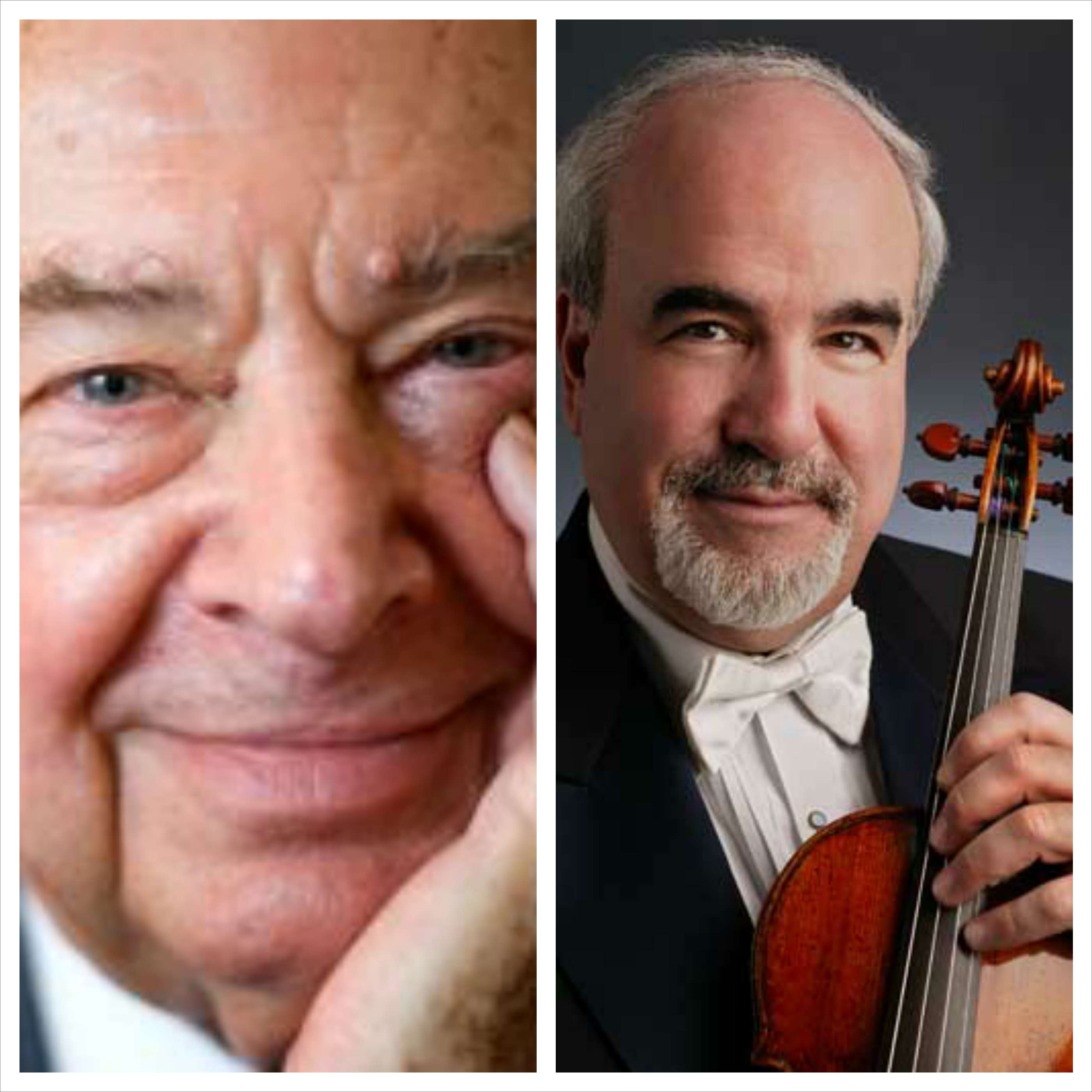|
Back
Maestro Frühbeck leaves us breathless New York
Avery Fisher Hall, Lincoln Center
12/12/2013 - & December 13, 14, 2013
Ludwig van Beethoven: Symphony No. 8 in F Major, Opus 93
Richard Strauss: Ein Heldenleben, Opus 40
Glenn Dicterow (Violinist), New York Philharmonic Orchestra, Rafael Frühbeck de Burgos (Conductor)

R. Frühbeck/G. Dicterow (© Ignacio Gil ABC/glenndicterow.com)
They don’t make conductors like Rafael Frühbeck de Burgos any more. With a lineage going back to the great conductors of the Viennese Imperial Courts, a classical education in Germany, he is one of the superb conductors of his birthplace, Spain, and his international reputation has, for 60 years, been sterling with orchestras (who reportedly find him personally delightful) and audiences (ditto).
More important, the 80-year-old Maestro has a pair of different personae. When coming out to the dais, he does look his age. When he stands up on the podium and raises his baton, he is a non-stop electrifying sight. His baton-hand whizzes up, down and around like a neophyte conductor, his left hand cues in absolutely everybody, from First Chair violin to the third trumpet. Nothing is left to chance. He has complete and utter control.
What is the result? Last night, he played two works, and the New York Philharmonic Orchestra registered with an acuity even rare for them. One or two horn flurries meant nothing at all (probably due to undue enthusiasm), since the Phil players were metaphorically leaping from their seats.
Beethoven’s Eighth has a totally erroneous reputation as one of the eve-numbered “minor” symphonies. But this, one of the composer’s own favorites, is never minor in its freshness, it sense of delight both in the world and in music.
Mr. Frühbeck turned out an exuberant performance. Delight in the opening movement, and taking the Allegretto scherzando quite a bit slower, so we could hear that Viennese grace, that indolent sense of happiness. The minuet was also pleasantly slower, for again we have a composite of brilliant melodies (Berlioz said the movement “fell from heaven into Beethoven’s head”).
Mr. Frühbeck made the finale into one of the highest spirits. I have often found a bit of violence in the orchestration, in those drums and repeated beats. But Mr. Frühbeck produced the most boisterous music, eschewing the violence for the second work of the evening.
The Strauss Heldenleben (A Hero’s Life) has been as controversial as Richard Strauss himself. Is this a symphony in disguise? A personal flaunting? Is it awful music dressed up with monstrous orchestration? Is it too blatant in its visual images?
For myself, it was never a controversy. One of my first recordings (conducted by that fervent old Nazi, Clemens Krauss), I loved almost every bit of it. The emotional outpouring, the great sounds of war, that climax which is overpowering as the opening to Zarathustra...
I loved every part except the third movement. The “love bit.” No ten-year-old kid likes that gooey stuff. Except that last night, it all made sense to me. Glenn Dicterow, the wonderful First Chair violin who, alas, will be retiring this year, played it under Mr. Frühbeck as if he’d never played it before. This was not Strauss’s paean to his wife. This was indeed a psychological picture (or at least an idealized picture) of the soon-to-be fearsome Madame Strauss.
As played by Mr. Dicterow, she is giddy, tender, a coquette, a seductress. Strauss made one of his critics actually speak his own name in the tubas, and Mr. Dicterow almost gave vocal voice to Madame Strauss. The “love part” became the portrait of a lady, a musical picture that, for better or worse, was greater than its music.
That of course was the problem with Strauss, that he was giving literal voice to earthly things. (Unlike Mahler, who never “condescended” to teacups and giggling women and swordplay.) But for the conductor last night, there was no controversy, no cutting across the edges to get at the composer’s real meaning.
The meaning was exactly what he wrote. The extraordinary counterpoint in the battle, the clucking of the critics, the quotes of his own past music were literally what Strauss set out to do–as did Mr. Frühbeck.
He conducted with his usual zest, but more important, he gave the most expansive picture of this hero’s life. He produced from the sprawling score a radiance, a humanness, a Teutonic immodesty and an earthly freshness, and every consort of the orchestra responded.
In the totality, we in the audience had little time to breathe, for Mr. Frühbeck began the evening with Promethean breath and ended with a cosmic breathlessness.
Harry Rolnick
|